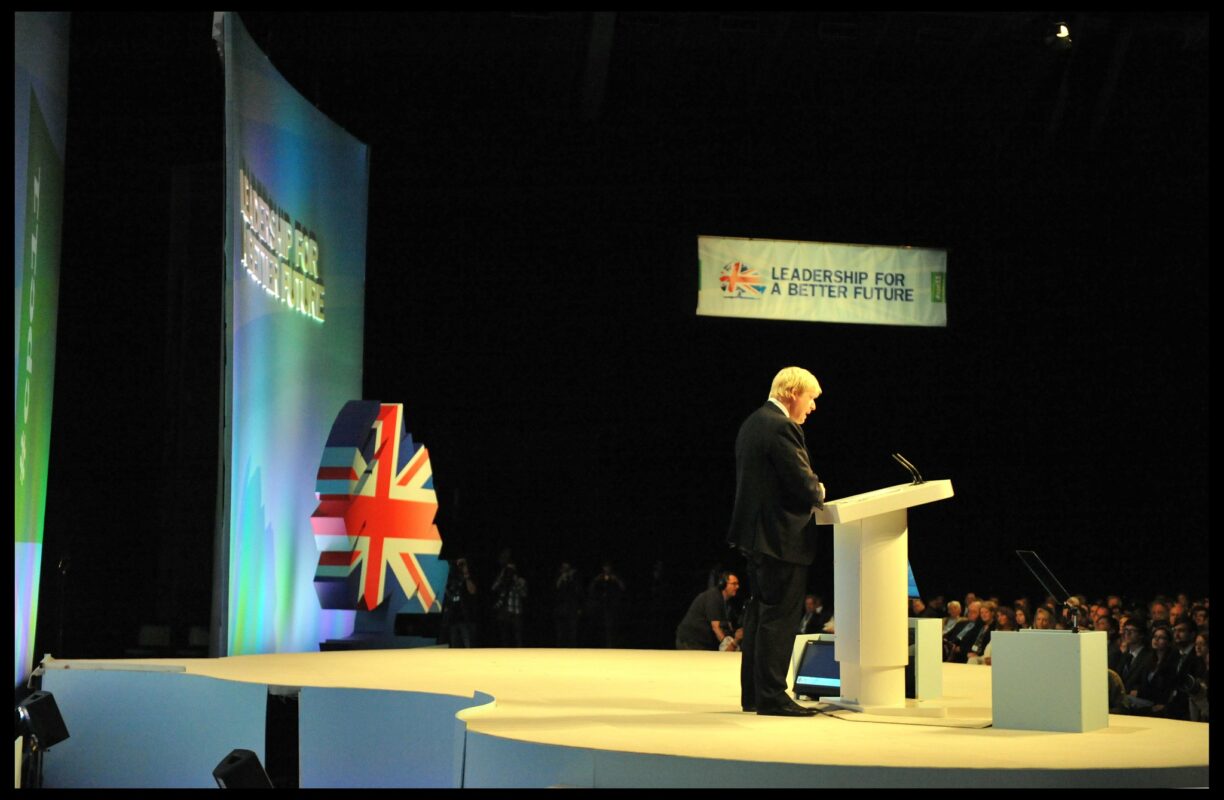
Image: BackBoris2012 Campaign Team.
The Conservative Party manifesto, launched on Sunday, fails to lay out any policies for solar power or energy storage, despite the party’s net zero ambitions.
Few details were given in the manifesto about the party’s plans for the energy sector if it is to win the general election, with offshore wind the only renewable technology highlighted.
The manifesto, launched in a ceremony in Telford, Shropshire by Boris Johnson, was Brexit heavy, with environmental and energy policy taking a back foot. Despite this the party promised that the first budget would be focused on the environment.
“Our first Budget will prioritise the environment: investing in R&D; decarbonisation schemes; new flood defences, which will receive £4 billion in new funding over the coming years; electric vehicle infrastructure including a national plug-in network and gigafactory; and clean energy.”
No solar, storage or infrastructure commitments
Solar power was conspicuously missing from the party’s manifesto, as was energy storage solutions, the national grid and onshore wind. The main energy pledge within the manifesto was the reconfirmation of the party’s commitment to offshore wind. It again promised that the UK will reach 40GW of offshore wind capacity by 2030, which includes support for new floating wind farms.
Beyond this, there was a statement that the party would “support gas for hydrogen production and nuclear energy, including fusion, as important parts of the energy system, alongside increasing our commitment to renewables”.
The renewable commitments have been met with criticism for the lack of detail in the manifesto. Dave Timms, head of political affairs at Friends of the Earth said: “It doesn’t even mention green-heating, on-shore wind and solar power. It's good to see a firm recommitment to the fracking moratorium, but there's nothing to stop the UK promoting and funding fossil fuels abroad. And there is no commitment to go faster than net zero emissions by 2050.
“Overall, despite some good policies its nothing like sufficient to stop the climate crisis,” he added.
The Conservative government has repeatedly faced the ire of the solar industry, from “inaccurate” solar statistics to the scrapping of the feed-in tariff.
Energy efficiency and CCS
There was a reaffirmation of a number of the party’s previous commitments, such as the ban on fracking and an investment of £800 million in the first carbon capture and storage cluster by the mid-2020s.
Further investment was promised energy efficiency measures for homes, schools and hospitals. It will invest £9.2 billion in these measures, to help lower energy bills and decarbonise.
Clean energy will also be supported in foreign aid, through the Ayrton Fund. This was first announced in September, and provides £1 billion “to develop affordable and accessible clean energy that will improve lives and help us to lead the world in tackling climate change.”
Expanding EV infrastructure
One of the most detailed pledges was the expansion of the EV infrastructure in the UK. This builds on Johnson’s inaugural campaign speech, given at the London Electric Vehicle Company’s manufacturing facility in the West Midlands last Wednesday.
“We will invest £1 billion in completing a fast-charging network to ensure that everyone is within 30 miles of a rapid electric vehicle charging station,” states the manifesto. “We will consult on the earliest date we can phase out the sale of new conventional petrol and diesel cars, while minimising the impact on drivers and businesses.”
Timms again was critical of the commitment, arguing it was too vague. “£1bn on electric car charging points is welcome, but just reviewing the end date for combustion engine vehicle sales rather than bringing the date froward to 2030 is a cop out. Sitting on fences doesn't cut carbon pollution.”
The Conservative government earlier this year committed to the UK becoming carbon neutral by 2050, in its much lauded net zero promise. But the manifesto provides little detail about this transition, in particular the role that energy, and renewables such as solar in particular, are likely to play.
In its manifesto, the Labour Party committed to solar providing a key part of the energy mix, promising enough solar panels to cover 22,000 football pitches. The Liberal Democrats promised an investment of £12 billion in renewables if elected, while the Green Party pledged to fit solar on 10 million homes by 2030.

